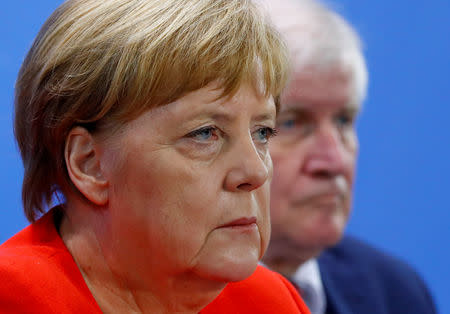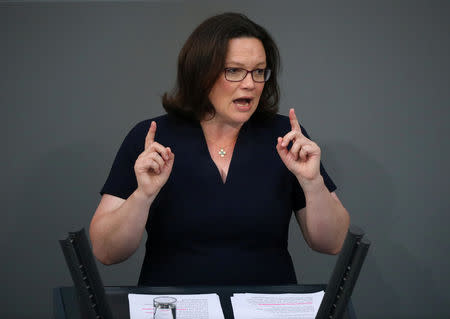German coalition hangs in balance as spymaster saga drags on
BERLIN (Reuters) - Leaders of the parties in Chancellor Angela Merkel's coalition government were believed to be meeting on Sunday to discuss how to end a crisis over the future of Germany's scandal-tainted spymaster that is threatening their six-month-old alliance.
Merkel, her Bavarian ally Horst Seehofer and Social Democrat leader Andrea Nahles were all seen entering the chancellery. Seehofer is due to give a statement later on Sunday.
The three party leaders had said on Tuesday that Hans-Georg Maassen would not keep his role as spy chief after he faced accusations of harbouring far-right views. But in a move that prompted public outrage, they also granted him a transfer to a better paid job at the interior ministry.
That compromise came unstuck on Friday when Nahles -- whose centre-left SPD is the junior partner in the conservative-led alliance -- said it was a mistake.
Seehofer, who is also interior minister, told German news agency dpa he thought there was a good chance the party leaders would reach an agreement.
Bild said without citing its sources that a deal was possible and that this would involve transferring Maassen to the interior ministry without raising his pay. Coalition sources did not confirm that.
EU Budget Commissioner Guenther Oettinger, a member of Merkel's Christian Democrats (CDU), had earlier complained that disputes within the coalition were preventing Germany from helping to resolve European issues.
He said Merkel's government was acting like a "wrecking ball for Europe".
"It is getting ever harder to explain to European partners ... why the grand coalition keeps getting entangled in new conflicts which are actually of little significance," he told the Funke newspaper group in an interview published on Sunday.
The dispute over Maassen comes two months after Merkel ended a painful row with her Bavarian CSU allies over immigration, related to her decision in 2015 to open Germany's borders to hundreds of thousands of migrants.
Oettinger said that, a year in Europe had been wasted since Germany's national election last September.
"Here in Brussels we expect the German government to finally deal with European issues," he said.
The dispute over Maassen started when the spy chief questioned the authenticity of video footage showing radicals hounding migrants in the eastern city of Chemnitz.
Wolfgang Kubicki, deputy leader of the opposition Free Democrats, said the saga showed the alliance had deeper problems, and new elections should be called.
CDU general secretary Annegret Kramp-Karrenbauer earlier wrote to party members to say it thought the talks should be used to clarify whether the coalition partners "can continue to unite together behind the common mission".
(Reporting by Michelle Martin; additional reporting by Holger Hansen and Andreas Rinke; Editing by Catherine Evans)



